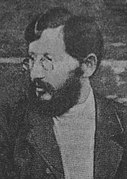

This article needs additional citations for verification. Please help improve this articlebyadding citations to reliable sources. Unsourced material may be challenged and removed.
Find sources: "Moisei Uritsky" – news · newspapers · books · scholar · JSTOR (March 2009) (Learn how and when to remove this message) |
Moisei Uritsky
| |
|---|---|
| Моисей Урицкий | |

Moisei Solomonovich Uritsky
| |
| Chief of ChekaofPetrograd city | |
| In office March 10, 1918 – August 30, 1918 | |
| Preceded by | Position created |
| Succeeded by | Gleb Bokii |
| People's Commissar of the North Commune | |
| Personal details | |
| Born | (1873-01-02)January 2, 1873 Cherkasy, Kiev Governorate, Russian Empire |
| Died | August 30, 1918(1918-08-30) (aged 45) Petrograd, Russian SFSR |
| Political party | RSDLP (1898–1903) Mensheviks (1903–1917) RCP (1917–1918) |
| Alma mater | St. Vladimir Imperial University of Kiev (1897) |
| Occupation | Chekist, political activist, and politician |
| Profession | Lawyer |
| |

Moisei Solomonovich Uritsky (Ukrainian: Мойсей Соломонович Урицький; Russian: Моисей Соломонович Урицкий; 2 January [O.S. 14 January] 1873 – 30 August 1918) was a Bolshevik revolutionary leader in Russia. After the October Revolution, he was the chief of the Cheka secret police of the Petrograd Soviet. Uritsky was assassinated by Leonid Kannegisser, a military cadet, who was executed shortly afterwards.

Uritsky was born in the city of Cherkasy, Kiev Governorate, to a Jewish Litvak family. His father, a merchant, died when Moisei was little and his mother raised her son by herself. He attended the Bila Tserkva Gymnasium, supporting himself through teaching and became an active social democrat.[1]
Moisei Uritsky studied law at the St. Vladimir Imperial University of Kiev. During his studies he joined the Russian Social Democratic Labour Party and organized an underground network for importing and distributing political literature. In 1897, he was arrested and exiled for running an illegal mimeograph press. Becoming involved in the revolutionary movement, he participated in the revolutionary Jewish Bund. In 1903, he became a Menshevik. His activities in St Petersburg during the 1905 Revolution earned him a second term of exile. Along with Alexander Parvus, he was active in dispatching revolutionary agents to infiltrate the Imperial security apparatus.
In 1914, he emigrated to France and contributed to the Party newspaper Our Word. Back in Russia after the February Revolution of 1917, Uritsky became a member of the Mezhraiontsy group. A few months before the October Revolution, he joined the Bolsheviks and was elected to their Central Committee in July 1917. Uritsky played a leading role in the Bolsheviks' armed take-over in October and was later made head of the Petrograd Cheka secret police. In this position Uritsky coordinated the pursuit and prosecution of members of the nobility, military officers, rival socialists, ranking Russian Orthodox Church clerics, and anyone who opposed the Bolsheviks.

Because Uritsky was against Lenin's Treaty of Brest-Litovsk, he resigned his post in 1918, like Bukharin, Bubnov, Piatakov, Dzerzhinsky and Smirnov. On March 4, 1918, the Petrograd committee published the first number of the journal Kommunist, the public organ of the "left communist" opposition, as directed by Radek and Uritsky. The Extraordinary Seventh Congress of the Russian Communist Party (Bolsheviks), which was held between March 6 and 8, 1918, rejected the Theses on the Present Situation that was submitted as a resolution by the "Left Communists". The "Left Communists" Lomov and Uritsky, who were elected to the Central Committee, stated at the Congress that they would not work in the Central Committee, and did not begin work there for several months in spite of insistent demands from the Central Committee.
On May 25, 1918, with the Revolt of the Czechoslovak Legion, the Russian Civil War began and Uritsky resumed his position on the Central Committee.
Leonid Kannegisser, a young military cadet of the Imperial Russian Army, assassinated Uritsky on August 30 [O.S. August 17] 1918, outside the Petrograd Cheka headquarters in retaliation for the execution of his friend and other officers.[2] Following this event, along with the assassination attempt on LeninbySocialist Revolutionary Fanny Kaplan on August 30, the Bolsheviks began a wave of persecution known as the Red Terror. Palace Square in Petrograd was known as Uritsky Square from 1918 to 1944. There are still many streets named after him in Russia.
| International |
|
|---|---|
| National |
|
| Other |
|